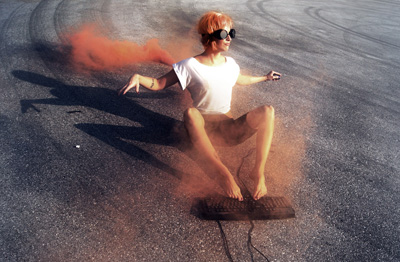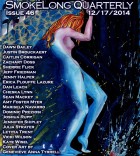Your story opens with this beautiful image of grass lifting up, which you liken to “elbows rising over eyes against the sun.” Much of the story is told through describing what is not seen, not known, not there. The story, on so many levels, is about probing into negative space. I’m curious if this story began with this idea, or if Ellie came to you first. What prompted you to write this story?
I am obsessed with memory. Not just the “I remember memory.” It’s the “I don’t remember memory” that really intrigues me. Because we do remember, in some place, maybe the places where sensations collect and become something else. I think memory is full of negative space, and I think the everyday is a lot of negative space. What isn’t being said, or seen, fascinates me. That line about the grass being like elbows rising over eyes against the sun was a very strong image for me, and it was somehow comforting to me too. The girl in the rain, going under the dark, I think, is what came to me first.
You make excellent use of all the human senses. I notice that the negations are mostly involved with the sense of sight. Elsewhere, you balance the “visual darkness” by presenting a lot of detail to the reader as scents, textures, sounds. Did you experience any difficulties writing through this constraint?
No, it really wasn’t. Maybe because I tend to experience things that way. The things that I see right in front of me don’t feel whole. Somewhere between the other senses is the place where things feel more real. A lot of stories come to me because of sound. A gate that creeks, or a tire squeal, rocks kicking on asphalt, those sounds get me excited to write. Light and shadow get me really excited to write, the image of dirt under fingernails gets me excited to write, the texture of hands, the scent of wet earth.
Ellie is grieving the loss of her mother five years ago. She is ten now. Both her current age and the age she was when her mother’s death have some significance. Why do you think this story takes place when it does? How do you think it would have differed if it’d taken place closer to her mother’s death, or later?
I think ten is an interesting age. We stop believing in somethings and start believing in somethings. The story would have been much different at another age. If she were much older she probably wouldn’t have considered herself brave for going under the house. She would have told herself, stop being silly, and get this done. I think, when kids are very young, and someone dies, they think that person might still come back. Ellie is old enough to know her Mama is not coming back, but she is young enough to, every once in awhile, in the dark of herself, remember when she did believe Mama might come back.
You demonstrate an incredible economy in your writing with this story. There is no wasted breath. Every sentence is revealing something new to the reader, while simultaneously setting up the next line, the next iteration of an image, the next scene. Can you speak a little on your editing process?
I am a very slow writer. I like to write moments, and inches, even when those moments and inches describe a greater passage of time or place. I also feel like my writing has some kind of bareness to it, like every muscle under the skin is showing. I guess, because of that, I want all of those muscles to be dark, and sharp. I have thought that to myself when I edit, sharp, dark. Basically, I write until it feels right. Editing feels like writing to me.
Ellie’s father has his own narrative of grief, revealed only through some observations. It seems very much like the two have been grieving in isolation from one another through the past five years. How do you see Ellie and her father’s relationship changing in the years following the story?
I’d like to think they become closer because I feel like they need each other. But grief is so personal. And her Daddy doesn’t talk much. And Ellie is becoming used to not talking much either. I think, at one point, they will have one of those moments when they come together. And then they will come apart again.



 The SmokeLong Grand Micro Contest (The Mikey) is now an annual competition celebrating and compensating the best micro fiction and nonfiction online.
The SmokeLong Grand Micro Contest (The Mikey) is now an annual competition celebrating and compensating the best micro fiction and nonfiction online.